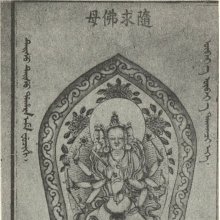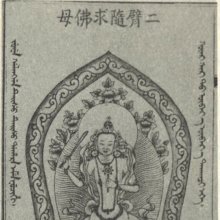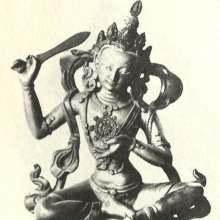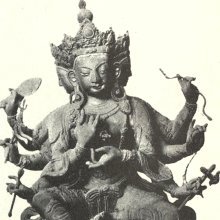Pratisara, Pratisarā, Pratishara: 16 definitions
Introduction:
Pratisara means something in Buddhism, Pali, Hinduism, Sanskrit. If you want to know the exact meaning, history, etymology or English translation of this term then check out the descriptions on this page. Add your comment or reference to a book if you want to contribute to this summary article.
Images (photo gallery)
In Hinduism
Natyashastra (theatrics and dramaturgy)
Source: Wisdom Library: Nāṭya-śāstraPratisarā (प्रतिसरा) is the Sanskrit name for a “red thread-bangle”, to be used at the ceremony of “installation of the gods”, during raṅgapūjā. According to the Nāṭyaśāstra 3.18-20, “Along with these gods should be taken red thread-bangle (pratisarā), the best kind of red sandal, red flowers and red fruits. With these and articles such as barley, white mustard, sunned rice, Nāgapuṣpa powder and husked saffron (priyaṅgu), the gods should be installed.”.

Natyashastra (नाट्यशास्त्र, nāṭyaśāstra) refers to both the ancient Indian tradition (shastra) of performing arts, (natya—theatrics, drama, dance, music), as well as the name of a Sanskrit work dealing with these subjects. It also teaches the rules for composing Dramatic plays (nataka), construction and performance of Theater, and Poetic works (kavya).
Ayurveda (science of life)
Source: Chulalongkorn University: Department of Eastern Languages (Pali-Sanskrit Section) (ay)Pratisarā (प्रतिसरा) or Pratisarāmaṇi refers to one of the Maṇis (protection amulets) mentioned in the Atharva-veda. Maṇis refer to small round objects made from natural plant parts or from the solid coverings of animal bodies. It has the properties of being an amulet for protection and warding off evil spirits. or as an herb for treating illnesses. Sudev Krishna Sharman G. listed 9 types of Maṇi [e.g., pratisarā-maṇi—means sesame (Seasamum)] according to the Atharvaveda including specifying assumptions about the meaning.

Āyurveda (आयुर्वेद, ayurveda) is a branch of Indian science dealing with medicine, herbalism, taxology, anatomy, surgery, alchemy and related topics. Traditional practice of Āyurveda in ancient India dates back to at least the first millenium BC. Literature is commonly written in Sanskrit using various poetic metres.
Shaivism (Shaiva philosophy)
Source: eScholarship: The descent of scripture: a history of the KamikagamaPratisara (प्रतिसर) refers to “(the rite of) tying of a ritual protection thread (for a king)”, according to the Kāmikāgama: an ancient Śaiva Āgama scripture in 12,000 Sanskrit verses dating to at least the 5th century and represented as an encyclopedic account of ritual instructions (kriyāpāda).—In modern print editions, the Kāmika-āgama is structured in two major parts. The Uttarabhāga consists of 98 chapters (paṭalas) [...] In Chapter 80, there is a description of a purification ceremony to be performed during the month of Puṣya. Chapter 81 describes ritual sacrifices to pacify the malefic influence of planets. And in Chapter 82, the practice of tying of a ritual protection thread (pratisara) for a king is detailed.

Shaiva (शैव, śaiva) or Shaivism (śaivism) represents a tradition of Hinduism worshiping Shiva as the supreme being. Closely related to Shaktism, Shaiva literature includes a range of scriptures, including Tantras, while the root of this tradition may be traced back to the ancient Vedas.
In Buddhism
Mahayana (major branch of Buddhism)
Source: De Gruyter: A Buddhist Ritual Manual on AgriculturePratisarā (प्रतिसरा) refers to an “amulet-cord”, according to the Vajratuṇḍasamayakalparāja, an ancient Buddhist ritual manual on agriculture from the 5th-century (or earlier), containing various instructions for the Sangha to provide agriculture-related services to laypeople including rain-making, weather control and crop protection.—Accordingly, [As the afflicted Nāgas said to Bhagavān]: “[...] However, O Bhagavān, from today on I make a vow in the presence of the Tathāgata. Wherever this spell-holder king will circulate, there, O Bhagavān, the Nāgas will not make calamities again. Wherever this heart-dhāraṇī is used for protection, [there is] rescue, shelter, safeguard and the sealing of the boundaries and sealing of the maṇḍala. Where an amulet-cord (pratisarā) is made, for that person, O Bhagavān, we will constantly ward off all calamities”.

Mahayana (महायान, mahāyāna) is a major branch of Buddhism focusing on the path of a Bodhisattva (spiritual aspirants/ enlightened beings). Extant literature is vast and primarely composed in the Sanskrit language. There are many sūtras of which some of the earliest are the various Prajñāpāramitā sūtras.
General definition (in Buddhism)
Source: Wisdom Library: Dharma-samgrahaPratisarā (प्रतिसरा) refers to one of the “five protectors” (pañcarakṣā) as defined in the Dharma-saṃgraha (section 5). The Dharma-samgraha (Dharmasangraha) is an extensive glossary of Buddhist technical terms in Sanskrit (e.g., pañcarakṣā and Pratisarā). The work is attributed to Nagarguna who lived around the 2nd century A.D.
Languages of India and abroad
Sanskrit dictionary
Source: DDSA: The practical Sanskrit-English dictionaryPratisara (प्रतिसर).—a. Dependent, subject.
-raḥ, -ram 1 A cord or ribbon worn round the wrist or neck as an amulet.
2) An ornament.
3) A watch, guard.
4) Assailing, an attack.
-raḥ 1 A servant, follower; विजये त्वर्यतां लेखः प्रतिसराय (vijaye tvaryatāṃ lekhaḥ pratisarāya) Pratijñā.
2) A bracelet, marriage-string; स्रस्तोरगप्रतिसरेण करेण पाणिः (srastoragapratisareṇa kareṇa pāṇiḥ) (agṛhyata) Kirātārjunīya 5.33; (= kautukasūtra); Mālatīmādhava (Bombay) 5.18.
3) A garland, wreath.
4) Day-break.
5) The rear of an army.
6) A form of incantation.
7) Healing or dressing a wound.
-rā 1 A female servant.
2) A thread, fillet; प्रतिसरया तुरगाणां भल्लातकशालि- कुण्ठसिद्धार्थं कण्ठेषु निवघ्नीयात् (pratisarayā turagāṇāṃ bhallātakaśāli- kuṇṭhasiddhārthaṃ kaṇṭheṣu nivaghnīyāt).
Source: Cologne Digital Sanskrit Dictionaries: Edgerton Buddhist Hybrid Sanskrit DictionaryPratisarā (प्रतिसरा).—name of a rakṣā (q.v.): Dharmasaṃgraha 5; Sādhanamālā 397.9 etc. (in this text oftener Mahā-pra°).
--- OR ---
Pratisāra (प्रतिसार).—m. (compare Prakrit paḍisāra, [Paia-sadda-mahaṇṇavo], and Hemacandra 1.206), turning back, regression: (lokadhātum…) avagāhya …°ro na kartavyaḥ Sukhāvatīvyūha 72.1.
Source: Cologne Digital Sanskrit Dictionaries: Shabda-Sagara Sanskrit-English DictionaryPratisara (प्रतिसर).—mfn.
(-raḥ-rā-raṃ) A servant, servile, dependent. m.
(-raḥ) 1. The rear of an army. 2. A garland, a wreath. 3. A bracelet. 4. Cicatrizing or healing, (as a sore.) 5. A form of magic or incantation. 6. Daybreak, morning. mn.
(-raḥ-raṃ) 1. A string worn round the hand at nuptials, &c. 2. Ornament, adorning. 3. The junction of the frontal sinuses of an elephant. E. prati before, sṛ to go, aff. ac .
Source: Cologne Digital Sanskrit Dictionaries: Benfey Sanskrit-English DictionaryPratisara (प्रतिसर).—i. e. prati-sṛ + a, I. m. f. n. A servant, dependent. Ii. m. 1. The rear of an army. 2. A garland. 3. A bracelet, [Kirātārjunīya] 5, 33. 4. A string worn round the hand at nuptials, Da- śak. in
Pratisara (प्रतिसर).—[masculine] a bracelet or ribbon used as an amulet.
Source: Cologne Digital Sanskrit Dictionaries: Monier-Williams Sanskrit-English Dictionary1) Pratiśara (प्रतिशर):—[=prati-śara] [from prati-śṝ] m. breaking, going in pieces (a-pratiś), [Aitareya-brāhmaṇa 2.]
2) Pratisara (प्रतिसर):—[=prati-sara] [from prati-sṛ] m. (ifc. f(ā). ) a cord or ribbon used as an amulet worn round the neck or wrist at nuptials etc., [Atharva-veda] etc. etc. (also f(ā). [Varāha-mihira; Dharmasaṃgraha 5]; and n. [gana] ardharcādi)
3) [v.s. ...] a bracelet, [Kirātārjunīya]
4) [v.s. ...] a line returning into itself. circle, [Śatapatha-brāhmaṇa]
5) [v.s. ...] assailing, an attack (a-pr), [Harivaṃśa]
6) [v.s. ...] a wreath, garland, [cf. Lexicographers, esp. such as amarasiṃha, halāyudha, hemacandra, etc.]
7) [v.s. ...] a follower, servant, [cf. Lexicographers, esp. such as amarasiṃha, halāyudha, hemacandra, etc.]
8) [v.s. ...] the rear of an army, [cf. Lexicographers, esp. such as amarasiṃha, halāyudha, hemacandra, etc.]
9) [v.s. ...] dressing or anointing a wound, [cf. Lexicographers, esp. such as amarasiṃha, halāyudha, hemacandra, etc.]
10) [v.s. ...] day-break, [cf. Lexicographers, esp. such as amarasiṃha, halāyudha, hemacandra, etc.]
Source: Cologne Digital Sanskrit Dictionaries: Yates Sanskrit-English DictionaryPratisara (प्रतिसर):—[prati-sara] (raḥ) 1. m. The rear of an army; a garland; bracelet; in- cantation; healing; day break. n. An ornament. a. Dependant.
Source: DDSA: Paia-sadda-mahannavo; a comprehensive Prakrit Hindi dictionary (S)Pratisara (प्रतिसर) in the Sanskrit language is related to the Prakrit words: Paḍisara, Paḍisāra.
[Sanskrit to German]
Sanskrit, also spelled संस्कृतम् (saṃskṛtam), is an ancient language of India commonly seen as the grandmother of the Indo-European language family (even English!). Closely allied with Prakrit and Pali, Sanskrit is more exhaustive in both grammar and terms and has the most extensive collection of literature in the world, greatly surpassing its sister-languages Greek and Latin.
Kannada-English dictionary
Source: Alar: Kannada-English corpusPratisara (ಪ್ರತಿಸರ):—
1) [noun] a small, thin sheet of metal engraved with mystic figures, hymns or syllables worn round the neck or upper arm with the belief that it would keep away evil, and protect; a talisman; an amulet.
2) [noun] a length of thread, dyed with turmeric powder, tied several rounds around one’s wrist, esp. during marriage, worship, etc.
3) [noun] a bangle or bracelet for the wrist.
4) [noun] a string of flowers.
5) [noun] a male domestic servant.
6) [noun] the rear portion of an army.
Kannada is a Dravidian language (as opposed to the Indo-European language family) mainly spoken in the southwestern region of India.
See also (Relevant definitions)
Partial matches: Sara, Prati, Cara.
Starts with: Pratisarabandha, Pratisarabandhaprayoga, Pratisaraka, Pratisarakara, Pratisaram, Pratisaramani, Pratisaranata, Pratisaraniya, Pratisarati, Pratisharana, Pratisharanabhuta, Pratisharasana.
Ends with: Apratishara, Avipratisara, Mahapratisara, Mangalapratisara, Rakshapratisara, Uragapratisara, Vipratisara.
Full-text: Padisara, Kankanika, Rakshapratisara, Pratisarabandha, Maharaksha, Mangalapratisara, Pancaraksha, Pratisaram, Mahapratisara, Pratisarya, Vipratisara, Prativarta, Uragapratisara, Five Protectors, Raksha, Mani, Pratisharana.
Relevant text
Search found 7 books and stories containing Pratisara, Pratisarā, Pratisāra, Pratishara, Pratiśara, Prati-shara, Prati-śara, Prati-sara; (plurals include: Pratisaras, Pratisarās, Pratisāras, Pratisharas, Pratiśaras, sharas, śaras, saras). You can also click to the full overview containing English textual excerpts. Below are direct links for the most relevant articles:
Bhakti-rasamrta-sindhu (by Śrīla Rūpa Gosvāmī)
Verse 3.4.24 < [Part 4 - Parenthood (vātsalya-rasa)]
Women in the Atharva-veda Samhita (by Pranab Jyoti Kalita)
5a. Prayer for Successful Pregnancy < [Chapter 2 - The Strīkarmāṇi Hymns of the Atharvaveda]
2. Rites Related to Birth (b): Garbhādhāna < [Chapter 5 - Women in the Rites and Rituals of the Atharvaveda]
Cosmetics, Costumes and Ornaments in Ancient India (by Remadevi. O.)
2.5. Various other Hand Ornaments < [Chapter 3 - Ornaments]
4. Beliefs Associated with Ornaments < [Chapter 3 - Ornaments]
Atharvaveda and Charaka Samhita (by Laxmi Maji)
Maṇis (medical amulets) in the Atharva Veda < [Chapter 3 - Diseases and Remedial measures (described in Atharvaveda)]
Medicinal herbs and plants in the Atharva-veda < [Chapter 3 - Diseases and Remedial measures (described in Atharvaveda)]
5a. Worm infestation (Kṛmi) in the Atharvaveda < [Chapter 5 - Diseases and Remedies in Atharvaveda and Caraka-Saṃhitā]
Natyashastra (English) (by Bharata-muni)
Satapatha-brahmana (by Julius Eggeling)
Kāṇḍa V, adhyāya 2, brāhmaṇa 4 < [Fifth Kāṇḍa]
Related products




